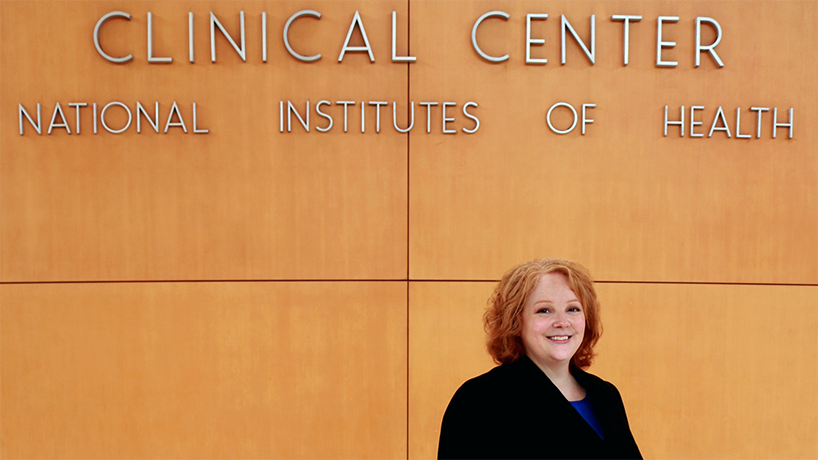
UMSL PhD student Stephanie Chidester is examining extracellular vesicles with the hopes of discovering biomarkers for a person’s metabolic state through a prestigious doctoral fellowship at the National Institute of Nursing Research. (Photo by Shavonne Pocock)
While working in the Huntsman Cancer Institute as a research specialist, Stephanie Chidester decided she wanted to be more directly involved with the people she was helping. That led her to return to school for a BSN at the University of Utah; onto the floor as a nurse in cardiovascular, post-surgical and orthopedic care; and back to school yet again for a nursing PhD at the University of Missouri–St. Louis.
Which has led Chidester back where she started.
“Ironically, I’m back in the lab right now,” she said. “Though I didn’t know if it would be possible when I started the PhD program, I had this dream that I might be able to combine my two careers somehow – enjoy the things I loved about working in basic research as well as all the things I loved about being a nurse.”
Chidester took the first step toward that aspiration in January when the College of Nursing student relocated to Maryland to complete her dissertation under the purview of the National Institute of Nursing Research, a part of the National Institutes of Health. She’s doing so as part of its Graduate Partnerships Program, a doctoral fellowship during which students complete coursework at their academic institution and then matriculate to the NINR to complete their dissertation research.
Through the program, the NINR grants recipients a stipend, tuition allowance, some travel money and health insurance along with the institution’s vast expertise and resources. Chidester is the first UM System nursing student to obtain the prestigious opportunity.
Her research, which investigates the molecular underpinnings of diabetes, is motivated by commonalities among hospital patients she noticed while working as a nurse. According to Chidester, about 40 percent of people in the U.S. are overweight or obese, which is a risk factor for developing Type 2 diabetes, yet only a fraction goes on to develop the disease. At the same time, there are 84 million with prediabetes who are at high risk.
“The problem is that we are not able to diagnose diabetes until it’s usually pretty advanced, since the disease is usually asymptomatic in early stages,” Chidester said. “Most people think of Type 2 diabetes as a disease of lifestyle because people don’t exercise, they’re eating too much or they’re eating the wrong foods. That’s a part of it. But there are also complex interactions with genetics and with other aspects of the environment, including chronic stress. It’s a complex, multifactorial disease.
“I’m interested in identifying some of those unique characteristics that make one person more predisposed to develop Type 2 diabetes than another person with the same lifestyle risk factors. My research has the goal of identifying some of these traits – biomarkers – that might reflect early risk and then making sure that interventions are put into place to prevent that development.”
Her research is part of the recent medical world trend toward personalized medicine, which bases treatment on unique characteristics or symptoms and looks at outliers in studies for whom the average treatment failed.
She’s examining extracellular vesicles – small packages of molecules secreted by the body’s cells that carry messages. As she isolates and examines the vesicles, Chidester hopes to get some sense of how these cargo molecules reveal the metabolic state of the person and what’s going on in the body.
She will be working with banked NIH blood and tissue samples from people with a history of obesity, with Type 2 diabetes and from the metabolically healthy, and she views her research as preliminary work that will one day translate into patient care. Her plan is to expand beyond the lab to develop a program that involves translational and clinical research, which applies the results of lab research to studies with humans. Her ultimate goal is to improve care for patients with Type 2 diabetes.
Working within the NINR has not only provided Chidester with dissertation material but also with a wealth of experiences and learning opportunities. So much, in fact, that they could potentially be a bit problematic.
“They warned me right off the bat that I’d have to be very selective about what I chose to do, or I would never make real progress going forward working on my research,” she said. “There are so many opportunities to train, to learn. There are seminars that you’re invited to pretty much every day of the week, and all of the different Institutes here try to be collaborative.”
That collaboration means that Chidester has access to mentors across disciplines. There’s her NINR mentor, Paule Joseph, as well as Jennifer Jones from the National Cancer Institute and Sushil Rane from the National Institute of Diabetes and Digestive and Kidney Diseases.
In addition to the NIH mentors, there are the many helpful faculty who’ve made her experience at UMSL invaluable, like her advisor Anne Fish and MaryAnn Bozzette, with whom Chidester worked with throughout her coursework as a research assistant, as well as the PhD program director Roxanne Vandermause.
Chidester feels that her experiences at UMSL prepared her to apply for the fellowship and to chase her dream of a unique career.
“I could not have asked for a better College of Nursing faculty to work with,” Chidester said. “They’ve been incredibly supportive and are very involved with the work that their students are doing. They have made sure I had the resources I needed through the application process and preparation. I’ve been learning the type of research here and doing some similar things to what I’ve done in the lab before. Now I’m figuring out how to bring that back around to patient care and symptom management to improve the lives and outcomes of people with diabetes.”














